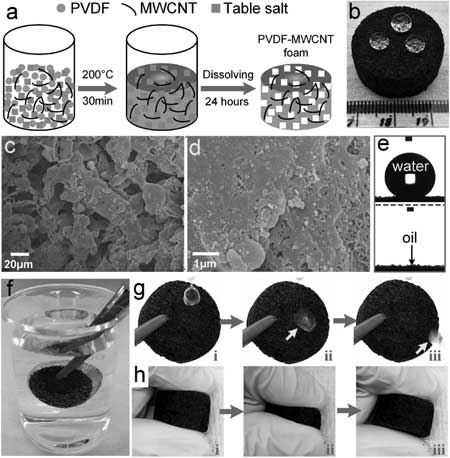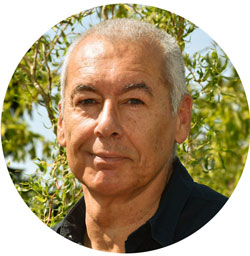| Posted: Sep 13, 2017 | |
Table salt as template for nanomaterials(Nanowerk News) Researchers used table salt, an economical and water-soluble material, as a sacrificial template and multiwall carbon nanotubes (MWCNTs) to roughen the surface of poly(vinylidene fluoride) (PVDF). PVDF is widely explored polymer to form functional films/membranes that can be used for various applications, such as oil/water separation and membrane distillation, due to its outstanding chemical resistance, biocompatibility, thermal/mechanical stability and UV tolerance. |
|
| However, owing to the poor solubility of PVDF, all the reported PVDF-based materials with superwettability involved the use of toxic organic solvents. These solvents are harmful to the operators and the environment and naturally result in volatile organics components (VOC) release, which is highly undesirable. | |
| The newly developed process, just reported in Advanced Functional Materials ("Table Salt as a Template to Prepare Reusable Porous PVDF–MWCNT Foam for Separation of Immiscible Oils/Organic Solvents and Corrosive Aqueous Solutions"), did not use or release any organic solvents. | |
 |
|
| CAPTION (click on image to enlarge) | |
| The PVDF–MWCNT foam showed its reusability and high adsorption capacity to various oils/organic solvents even after 48 hours intense UV exposure. The porous oil/organic solvent adsorbent could be easily reused by squeezing, heating, or releasing in other solvents for more than 10 cycles without an obvious decrease in adsorption capacity. | |
| The prepared porous foam could be easily compressed to more than 50%, and almost fully recovered after release. | |
| The oil/organic solvent adsorption capacity of the prepared porous foam was as high as 300–1200% of its own weight depending on the density and viscosity of the oils/organic solvents. | |
| The team further demonstrated a highly stable and continuous separation of oils/organic solvents and corrosive aqueous solutions using a vacuum-assisted PVDF–MWCNT foam adsorption system in highly acidic, alkaline, and salty environments. | |
| "The organic solvent-free and reusable PVDF–MWCNT foam is a promising candidate for large-scale industrial separation of oil/organic solvent and water in corrosive, turbulent, and outdoor conditions, with minimized pressure to the environment," the authors conclude their report. |
 By
Michael
Berger
– Michael is author of three books by the Royal Society of Chemistry:
Nano-Society: Pushing the Boundaries of Technology,
Nanotechnology: The Future is Tiny, and
Nanoengineering: The Skills and Tools Making Technology Invisible
Copyright ©
Nanowerk LLC
By
Michael
Berger
– Michael is author of three books by the Royal Society of Chemistry:
Nano-Society: Pushing the Boundaries of Technology,
Nanotechnology: The Future is Tiny, and
Nanoengineering: The Skills and Tools Making Technology Invisible
Copyright ©
Nanowerk LLC
|
|
|
Subscribe to a free copy of one of our daily Nanowerk Newsletter Email Digests with a compilation of all of the day's news. |
